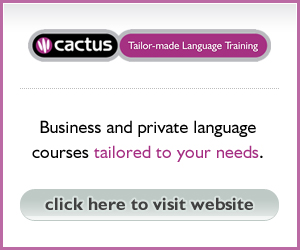The Diploma in Languages
Tuesday, 27th January 2009

With so many complaints about the current lack of modern language provision in schools, and the resulting deficit in the number of Brits who are able to speak foreign languages, the introduction of the Diploma in Languages can only be a positive change.
Our Academic team at Cactus is pleased to have had the opportunity to provide guidance and support on key issues as part of the Steering Group for the Diploma.
About the Diploma
The Diploma is a new qualification for 14-19 year olds that is different to GCSEs and ‘A’ Levels in that students are able to:
- get practical experience
- learn in the classroom
- find out about an area of work they’re interested in.
The Diploma also allows students to keep all their options open. When they finish the qualification, they can choose to stay at school or college and do another course (such as ‘A’ levels or an NVQ), go on to university, do an Apprenticeship or go into a job with training.
In September 2008, the teaching of the first set of Diplomas began. These included Diplomas in Construction and the Built Environment, Creative and Media, Engineering, Information Technology, and Society, Health and Development. A further 12 Diplomas are now in development, one of which is the Diploma in Languages, which will be available from September 2011.
The hope amongst the ‘creators’ of the Diploma in Languages is that:
‘The Diploma in Languages will prepare young people to communicate effectively in a range of languages, both at home and abroad on a social and professional level. It will equip an increased number of learners with the intercultural skills necessary to live and work in harmony with people of other cultures and open up for them the wider world and all its possibilities.’
Themes and topics to feature as part of the Diploma will include:
-’How language works’ – this is aimed at helping students understand the way language is constructed, and to become independent language learners.
-’Global and international dimensions’ – students will be shown how to place languages in the context of the wider world, and of today’s multicultural society.
-’Languages in context’ – this is designed to show how languages are important in aspects of life such as music, film, food and sport.
-’Professional communication’ - students will be able to learn about the skills they would need to work in teaching, translation and interpreting.
-’Languages in the workplace’ – this will explore how languages are used in jobs at home and abroad.
-’Social communication and networking’ – it is hoped that this will show the relevance of language learning to social interaction, and the importance of technology.
Levels
The Diploma in Languages will be available to study at three levels:
• Foundation (Level 1) is the same as 5 GCSEs at grades D-G
• Higher (Level 2) is the same as 7 GCSEs at grades A* to C
• Advanced (Level 3) is the same as 3.5 A Levels
Diploma structure
All Diplomas are structured in the same way, with three broad areas of content:
• Principal Learning
• Additional/Specialist Learning
• Generic Learning
‘Principal Learning’ will focus on developing the core knowledge, understanding, skills and attitudes relevant to the use of languages both in and outside the workplace. Learning will draw on realistic contexts and materials and is designed to provide learners with an understanding of the environments languages in which languages can be used.
‘Additional/Specialist Learning’ will enable learners to specialise further or to select units which will complement their programme. For example, students may be able to choose to learn other languages or learn more about specific industries.
‘Generic Learning’ will provide students with essential skills in preparation for successful employment, training and further study, including Maths, English and ICT.
Although it won’t be available for a couple of years yet, the Diploma in Languages looks very promising for the future of language-learning in schools.
Tags: diploma, schools, languages, tailor-made, german, french, spanish
Posted by Laura Lippert 2009-01 under Teaching Languages, In the news,
Permalink
